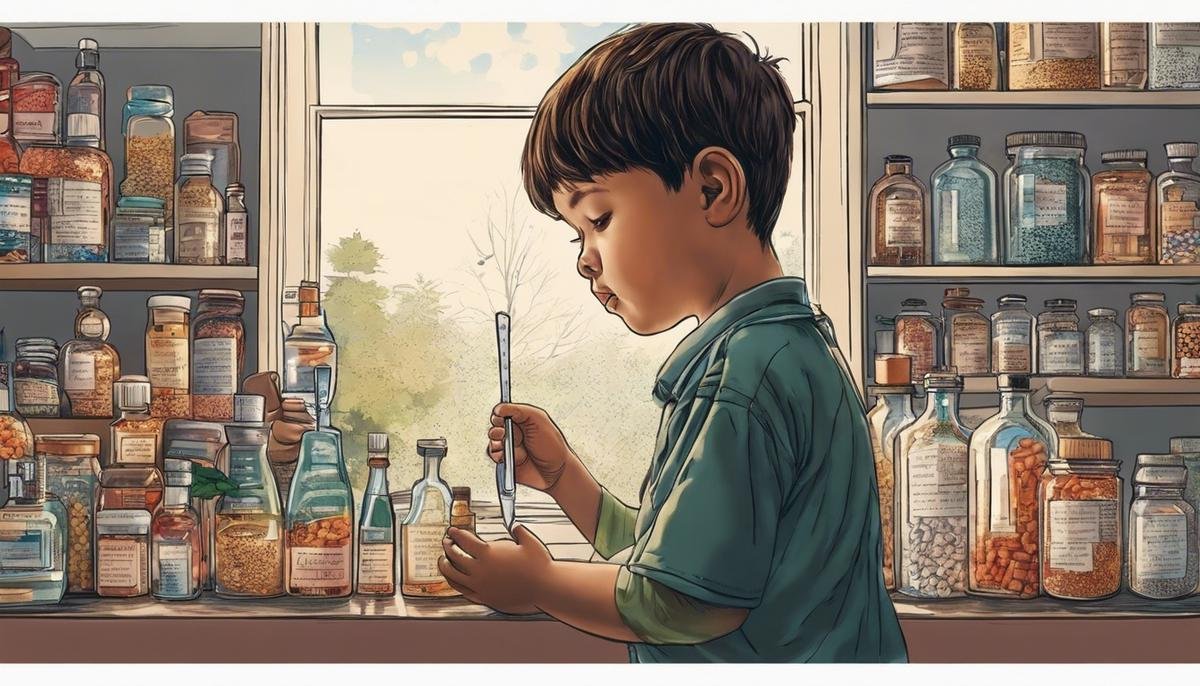
Every child has unique needs and ways of seeing the world around them – a reality that is wholly amplified in autistic children. This unique perspective often extends to daily routines, such as medicine intake, leading to refusal due to various reasons. This write-up aids in understanding the complexities behind this refusal, offering insight into the sensory sensitivities, behavioral issues, communication barriers, and attachment to routines that autistic children commonly face. Practical strategies to manage this medication refusal are also discussed, as are techniques that can foster a greater sense of participation and control within the child. Additionally, indicators of when it might be necessary to bring in professional assistance are explored to ensure optimal support and care.
Understanding the reasons behind medication refusal
Understanding Why Autistic Children May Refuse to Take Medications
Around the world, parents strive to do what’s best for their children. This is especially true for parents of autistic children, who often face unique challenges and triumphs. One such challenge that might be familiar to many parents is when their child refuses to take their prescribed medications. So why is this?
Autism Spectrum Disorder (ASD) affects individuals differently, leading to a wide variety of behaviors and reactions. What seems a simple task to us, like taking a small pill, can become an uphill battle for an autistic child.
Firstly, autistic children typically deal with numerous sensory issues. These could manifest in hypersensitivity towards taste and texture. This explains why a child may refuse to swallow a pill or even chew a tablet. The medicine’s bitter taste or chalky texture can be overwhelming to a kid with ASD, causing them to reject all forms of medication.
In other cases, it’s more about routine and predictability. Autistic children often thrive on familiar patterns and situations. So, introducing a new element into their daily routine can be disruptive and anxiety-inducing. Medicines, especially for those children who’ve never had to take them before, are unfamiliar and can be perceived as threats to their comfortable and predictable world.
Control over their environment can be another essential aspect for an autistic child. Requiring them to take a pill can feel like an imposition and trigger resistance. This refusal gives them a sense of control in a situation where they may feel overwhelmed or powerless.
Understanding the “why” behind your child’s refusal to take medication is only the first step. The real challenge lies in figuring out how to work around these obstacles and ensuring your child gets the necessary treatment they need.
For the sensory issue, it may be worth talking to the prescribing doctor or a pharmacist. They can often provide alternatives or adjustments, like flavored medications or different dosing forms (liquids, powders, or gummy supplements), to make the process less stressful for the child.
To handle issues of routine disruption, try incorporating the medication into a part of their established routines. This could be with a specific meal or during their bedtime routine. The idea is to frame the medication as a regular, predictable part of their day, and not an intrusive or unexpected occurrence.
For the child seeking control, involve them in the process as much as possible. Allow them to decide when and where they take their medication (within reason, and under supervision). Providing choices can give them a sense of control and ownership over the situation, making them more likely to comply.
In the end, remember that patience, empathy, and creativity are your best tools in handling these challenges. Know that you’re not alone in these struggles. Connect with other parents dealing with similar situations, reach out to professionals in the field, or join support groups. There is always a wealth of experience and resources out there to lend a helping hand in ensuring the best for your child.
Indeed, every child is different. And that is what makes them wonderfully special. Understanding their uniqueness not only helps you as a parent but also, contributes significantly to a nurturing, loving, and inclusive environment at home.

Effective techniques to manage medication refusal
Title: Inspired Paths to Addressing Medication Refusal in Autistic children
Every family journey is unique, just like every child, and when you are parenting an autistic child, the path expands with growth and learning curves. One such curve, often a steep and tricky one, can be managing medication refusal, which is prevalent among autistic children. The part of this journey already traveled covered valuable footing, such as understanding sensory issues, establishing routines, embracing autonomy, and the invaluable role of empathy and creativity. But there are more aspects that we can navigate to ensure the trip is smoother and less stressful for both the child and parents.
Let’s explore further!
1. Knowledge is Power:
It’s critical to educate ourselves, and more importantly, educate our child about the medication. An understanding of how the medication helps can go a long way in encouraging acceptance. Use simple terms that resonate with them and maybe even make it fun with a relatable story. Storytelling is a hugely effective technique that helps forge connections and explanations to why the medicine is crucial.
2. Positive Reinforcements:
Another effective tool can be positive reinforcements. This can serve as a reward system for taking medication. The rewards should not only recognize the act of taking medication but also reinforce the concept that medication helps in leading a healthier and happier life.
3. Maintain Consistency:
Consistency is key as it reduces the stress of unpredictability for our kids. Whether it’s the timing of the medicine or the method (syringe, spoon, etc), keeping it constant helps them recognize it as part of their usual routine.
4. Flavor Twist:
If taste is the challenge, some pharmacies offer flavored medicines, which can make medication more palatable. Some autism-friendly pharmacies can even convert pills into liquids for easy consumption. Always consult with your doctor or pharmacist before attempting any modifications, though.
5. Celebrate Success Small or Large:
Celebrate each step forward, no matter how small. Acknowledging victories boosts your child’s confidence, helping them understand that they are capable of overcoming challenges.
6. Adopt a Patient Approach:
Be patient and reassure your child they can take their time. Making medication time a quiet and stress-free environment encourages cooperation.
7. Involve a Professional:
If all else fails, consider seeking assistance from a professional, like an occupational therapist. They are trained to handle such issues and can provide techniques that are clinically tested.
Remember, every child is unique, and what works for one child may not work for others. Try different approaches and techniques until you find what works best for your child. Building an open community of fellow parents, medical professionals, and caregivers who willingly share their experiences can also provide fresh ideas and solutions. Our collective strength is in embracing our differences and remembering, this isn’t about winning a confrontation; it’s about nurturing for better health.
Happy parenting!

Involve children in the medication process
Empowering Your Child: Making Medication Takings Easier
Understanding why children may resist medication is the first step, but how can you turn that knowledge into action? Celebrating the individuality of a child is fundamental, so let’s explore more personalized strategies.
Knowledge truly is power. Discuss the importance of medication with your child. Children are more perceptive than we often give them credit for – explaining why they need to take their medication and its benefits on their health helps to instill understanding rather than resistance. They say curiosity is a teacher, so encourage questions. This isn’t just for children old enough to comprehend. You’d be surprised how younglings can grasp concepts if explained well, tailored to their level of understanding.
Positive reinforcements go a long way in encouraging your child to take medication. Consider rewards, stickers, or praise as a mechanism to build and strengthen your child’s willingness. Remember, the goal isn’t to coerce but to build a positive association with the process. Star charts or the prospect of a special treat post-medication can make the process much more agreeable. Seek a balance – reward the behavior, not the outcome.
Consistency is key. While, yes, children crave variety, there’s a comforting element to a routine, especially when it comes to medicine. Maintain a regular schedule for medication. This helps children mentally prepare for it, and over time, it may just become another part of their daily lives, like brushing their teeth.
Medication doesn’t have to be a bitter pill to swallow! Explore ways to make it more palatable. Whether that’s using a flavor add-on approved by your doctor or pharmacist or wrapping the pill in a favorite food, finding a palatable solution can help overcome sensory-related refusals.
Celebrate every victory, big or small. Made it through a week of medicine without tantrums? That deserves recognition. Even if the week was rough, but today was better, celebrate! Gestures of appreciation show your child that their efforts are acknowledged and appreciated.
A patient approach is necessary when dealing with children refusing medication. Recognize that it’s challenging for them–empathize with them and exhibit unwavering patience. Instilling change takes time.
Lastly, there’s no harm in seeking advice from professionals. Your pediatrician, a child psychologist, or even a pharmacist can provide tailored suggestions and strategies to encourage medication adherence in children.
Remember, every child is unique, they will have their specific battles when it comes to taking medication. Through knowledge, positive reinforcement, consistency, a hint of flavor, celebrating success, patience and seeking professional advice, you’ll be better equipped to handle medication refusal. Your journey, dear parents, is not to fight in the battle, but to support them in winning the war against their health hurdles.

Seeking Professional Assistance
Keeping the Child’s Best Interest at Heart: When to Seek Professional Help for Medication Refusal
Being a parent comes with boundless love and innumerable responsibilities, with our little ones’ health right at the top of the list. Sometimes, though, despite our best efforts, administering necessary medication can become a battleground. But remember, you’re not alone in this. There are times when it’s not only appropriate, but also advantageous, to seek professional help in managing medication refusal.
One of such times is when medication refusal becomes consistently challenging, disrupting daily life, and potentially risking the child’s wellbeing. A child’s prolonged refusal to take their medication, despite your creative methods, might signal deeper underlying issues. In such a situation, involving a healthcare professional can be a significant step towards resolution.
These professionals, such as a pediatrician or a child psychologist, can provide a fresh perspective, as well as extend their expertise to unpick any hidden fears or anxieties your child may be experiencing. Sometimes, refusal might stem from a past negative experience or a simple misunderstanding about what the medicine does. A child psychologist can employ strategies tailored to your child’s age and developmental level to tackle this.
Medication refusal might additionally indicate a side effect that your child can’t convey. They may be experiencing discomfort such as stomach aches or dizziness which is making them reluctant. Discussing these possibilities with a pediatrician can help adjust the medication or its dosage to make it more bearable for your little one.
Pharmacists also play a crucial role in the equation. We all know that the bitterest pills, metaphorically and literally, are often the hardest to swallow. A conversation with your pharmacist can reveal possibilities like flavor additives that can make the medication more palatable for your child. They might also suggest alternate delivery methods, like chewable tablets or liquid forms, if the pill swallowing is an issue.
Last, medication refusal, particularly in teens, might veil a cry for help or a struggle with mental health issues. If the refusal goes hand in hand with changes in their behavior, mood, or social interactions, it might be the right time to involve a professional to rule out conditions like depression or anxiety.
At the heart of success is recognizing that every child is unique, and what worked for another may not work for your own. Your understanding of your child, paired with professional advice when needed, can pave the way for a smoother medication process. Through patience, persistence, and partnership with professionals, the difficult journey towards accepting medication can be made easier. Every milestone achieved, big or small, is a cause for celebration – another step towards the matchless goal of ensuring your child’s well-being.

Maintaining the health of an autistic child requires more than just routine check-ups and medicine – it involves nurturing an environment where they feel safe, understood, and empowered. From understanding the root causes of medication refusal to implementing effective, child-friendly strategies that encourage compliance, parents and caregivers play a crucial role. Helping the child gain a sense of control through their involvement in the medication process can lead to a significantly increased willingness to take much-needed medicine. Ultimately, if these measures and overall consistent approach do not yield the desired results, seeking professional assistance is advised, affirming that it’s not a failure, but a significant step towards better health care and management. The journey might seem challenging, but with empathy, patience and the right techniques, managing medication refusal in autistic children may become less stressful.




